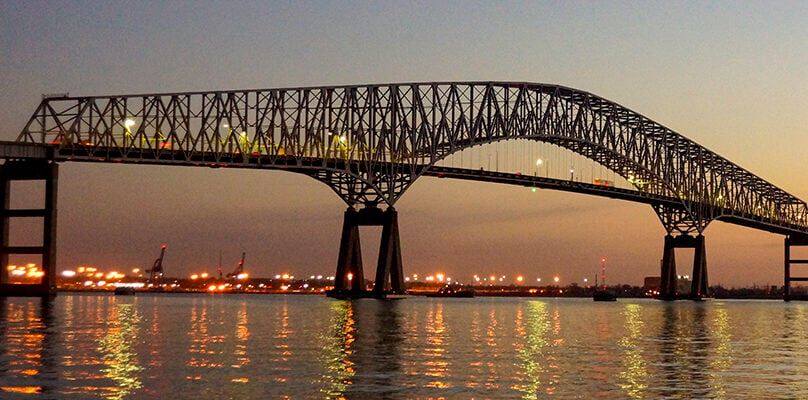Francis Scott Key Bridge Baltimore, MD
Early Tuesday morning, the Francis Scott Key Bridge in Baltimore, MD, collapsed after a cargo ship collided with a support column, causing the bridge to collapse. The Francis Scott Key Bridge is a significant commuter route carrying the Baltimore Beltway I-695 over the Patapsco River at the southern end of the Baltimore Harbor, and it’s the state’s number one thoroughfare for hazardous materials, which are not allowed to go through the underwater roadway tunnels in Baltimore.
Local agencies are now rerouting vehicles transporting hazardous materials through west Baltimore:
Harbor Crossing alt routes are I-95 or I-895 tunnels. Vehicles transporting hazardous materials (includes propane over 10 lbs) are prohibited in tunnels and should use the western section of I-695 around tunnels. https://t.co/L32avzic9T
— MDTA (@TheMDTA) March 27, 2024
New reports state that as many as 1.8 million gallons of fuel and other hazardous materials may have spilled into the water. Authorities have suspended their search-and-rescue mission for the six bridge workers who fell into the water and are now presumed dead.
ABC News reports,
Federal officials are monitoring about 1.8 million gallons of fuel inside the container ship Dali for its “spill potential,” according to an unclassified memo from the federal Cybersecurity and Infrastructure Security Agency. But a U.S. official familiar with the matter told CNN “lots would have to go wrong” for that amount of fuel to spill.
The Department of Homeland Security has also deemed the water near the crash site unsafe for divers, according to a memo obtained by ABC News.
A search-and-rescue effort for six people believed to have fallen from the collapsing bridge into the frigid waters of the Patapsco River below has been suspended and will shift to a recovery mission, officials said.
An elite Coast Guard team is examining 13 damaged containers, “some with Centers for Disease Control and Prevention [CDC] and/or hazardous materials [HAZMAT] contents,” the CISA memo said. The team is also analyzing the ship’s manifest to determine what was on board and if any materials could pose a health risk, the source said.
“There is minor sheening on-scene. Booming has been ordered and is staged but will not be placed until search and rescue and dive operations are complete,” the document said. “The amount of potential oil spill is 1.8M gallons of marine grade diesel.”
More from Fox:
The Singapore-flagged cargo ship that struck the Francis Scott Key Bridge, causing its collapse, was transporting containers with hazardous materials, the U.S. Coast Guard said.
Vice Admiral Peter Gautier said during the White House press briefing that of the 4700 containers on board the Dali, 56 contain hazardous materials and two are missing overboard. The ones that are in the water do not contain hazardous materials, he told reporters.
“There is no threat to the public from the hazardous materials on board,” Gautier said.
A specialized hazmat team went aboard the ship to inspect the cargo.
National Transportation Safety Board (NTSB) Chair Jennifer Homendy announced on Wednesday that the data recorder known as the “black box’ has been recovered from the DALI cargo ship that crashed into the Francis Scott Key bridge early Tuesday morning.
The black box is expected to reveal a timeline for the DALI and ultimately lead to what caused the ship to lose its power.
The post UPDATE: DHS and Coast Guard Say Cargo Ship that Struck Francis Scott Key Bridge Was Transporting 1.8M Gallons of Fuel and 56 Containers with Hazardous Materials appeared first on The Gateway Pundit.






